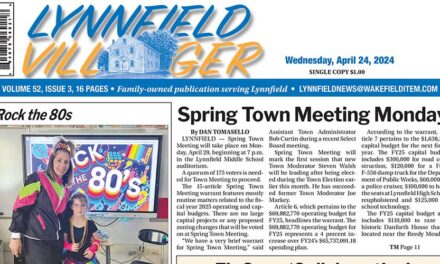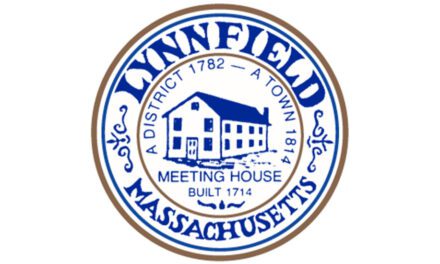Published in the November 30, 2016 edition
By DAN TOMASELLO
LYNNFIELD — On Monday, the Board of Selectmen voted to set the residential and commercial tax rates despite the objections of several MarketStreet Lynnfield business owners in attendance.
Assessing Manager Raymond Boly said the residential tax rate will decrease by 72 cents, from $14.50 per thousand to $13.78 per thousand. The “average” tax bill for a single-family homeowner in town will be $8,516.
The commercial, industrial and personal property (CIP) tax rate will decrease by 88 cents per thousand of valuation, from $17.68 to $16.80. The average tax bill for commercial property will be $17,305.
Boly said the residential and CIP properties have been reevaluated this year. He said the valuation of residential properties is up 9 percent while the valuation of commercial properties is up 8 percent. He noted the residential and commercial tax rates “can change slightly” while the state Department of Revenue certifies the rates and checks the town’s math.
In a phone interview with the Villager, Boly said the average residential home was assessed at $566,800 last fiscal year and the average tax bill was $8,218.
Additionally, the selectmen voted 3-0 to maintain the town’s tradition of shifting the tax rate off of residential properties and on to commercial properties. Boly said “shifting the tax rate moves the tax burden to be raised from the residential (and) open space classes to the CIP classes.”
“The town has split the rate between commercial and residential since 2004,” said Boly.
In response to a question from Selectmen Chairman Phil Crawford, Boly said the shift is equitable.
“Historically, the town has used the shift to offset some of the appreciation between residential and commercial property values,” said Boly. “This year, the revaluation of commercial properties went up to 8 percent when it was zero the last three years.”
There will be no residential or commercial tax rate exemptions.
MarketStreet concerns aired
A number of MarketStreet business owners expressed concerns about the commercial tax rate during the tax classification hearing.
Gaslight co-owner Jeffrey Gates said he also owns restaurants in Boston and said the town’s new commercial tax rate is significantly higher than the Hub’s.
“The town of Lynnfield is our host and the customers who come in our door live here,” said Gates. “When we signed our lease, we were told our taxes would be $3.50 per square feet. We pay $2.36 per square foot at Cinquecento in Boston and we pay $2.48 at Gaslight in Boston. At Aquitaine in Chestnut Hill, I pay $6.42 per square foot. I pay $6.56 at Metropolis in Boston and I pay $7.80 at Aquitaine at Legacy Place. My most recent tax bill for Lynnfield puts me at $11.94 per foot. For a small guy like us, we have a $76,000 tax bill in Lynnfield and that was never an expectation of ours. It caught us completely off guard. When restaurants open, we will be lucky if we make any money at all for the first five years. What we end up doing for the first five years is paying the bank.
“The people who make money in restaurants are bartenders and servers. We are in that struggling period at Gaslight and we are trying to find our feet. This tax bill is not a good thing.”
Boly explained the tax rate is based on the “assessed value of the property at market value.”
Gates warned the selectmen and the Board of Assessors that “if you want small businesses to succeed (at MarketStreet), you have to be careful with stuff like this.”
“If not, you are going to end up with big box stores here,” added Gates. “These kinds of numbers are what those folks pay. It’s certainly not what small business owners can afford. I am sure the Apple store is not even going to notice this, but we certainly will.”
Selectman Chris Barrett noted Lynnfield’s commercial tax rate is “pretty low compared to other communities.” He also said the selectmen have a responsibility to the town’s residents in addition to business owners.
Patrice Lane resident Pat Campbell said residents, particularly senior citizens, also “struggle” with paying their taxes. She blamed MarketStreet for causing an increase in public safety costs.
“We are struggling with the burden,” said Campbell.
In response to a question from Campbell, Boly said MarketStreet has filed for an abatement, which was denied by the Board of Assessors.
“(MarketStreet) has filed an appeal and that is presently pending,” said Boly.
Board of Assessors member Richard O’Neil agreed.
“We have had an ongoing conversation with the developer and the management company, WS Development,” said O’Neil. “We asked for information the first year and they chose not to provide it. And as the time passed, they paid their tax bill. They have continued to develop and have continued to succeed. They came and asked for relief. We asked for information and it wasn’t provided to our assessing manager. They are providing some of that information this year to support their current request for an abatement. We have had very civil conversations about that and because they have filed for an abatement, it allows us to have a conversation with them. All of the information they did not provide will be provided during the discovery process. We are very, very confident in the valuations we assess. We will see how it plays out.”
Crawford said the town puts money aside in an overlay account if abatements are awarded to commercial property owners.
WS Development Executive Vice President Tom Desimone said MarketStreet has a “very good relationship” with Boly and the Board of Assessors, but said, “we have a disagreement with value.”
“Those things happen and we will deal with that in due course,” said Desimone. “I want to clarify a couple of things. We came to this town eight years ago and during the permitting process, we were required to provide an economic impact statement. We hired an independent expert who specializes in evaluating the impact of economic development from a tax standpoint. The economic impact statement indicated MarketStreet would generate $1.5 million in property tax revenue for the town, and that the cost to the town would be several thousand dollars. That $1.5 million provided the basis we told (Gates) and other tenants would translate to $3.50 per square foot. The first assessment we received was significantly higher than we thought it should be. In the 30 years I have been doing this, my firm has provided the information (O’Neil) alluded to on less than five occasions. And the reason why we do that is because its private information. We have filed for an abatement; it was denied and we are going to go through a process with the Appellate Tax Board. In order to have that right, we have provided the information required and requested by the town. The reason why we have done that is we are approximately paying $3.5 million dollars in taxes. My tenants pay a certain percentage of the taxes and we pay a certain percentage. I feel it’s our responsibility to take this route to lower our taxes. Our assessment of MarketStreet Lynnfield is $480 per square foot of space. That number far exceeds what the town of Burlington has assessed the Burlington Mall and the city of Peabody has assessed Northshore Mall.”
Polka Dog Bakery owner Robert Vansickle said he owns “the smallest shop in MarketStreet.” He said the commercial tax rate will have a negative impact on his business.
“I have a bunch of retail stores in Boston and I am also a homeowner in Boston, so I understand both sides,” said Vansickle. “I am a business owner who is trying to keep my business alive. It’s hard for me to juggle my interests because I love being in Lynnfield and we have great customers here. I feel at home here and the town has been very welcoming to us. But at the end of the day, I can’t give my employees raises if I am paying between $15,000 and $20,000 in taxes. It’s not just residents and business owners who are suffering, it’s my employees who suffer. It trickles down. While I certainly understand with increased valuations comes increased rents and increased taxes, I feel like there needs to be moderation. We just got our first assessment and it took us 13 months to pay that bill because I didn’t have $15,000 in my bank account. The landlord allowed us to do that, but it raises the question if I can continue doing business here. I could be replaced pretty easily.”




